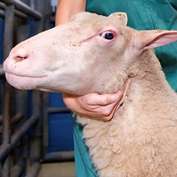A new way of measuring the stress levels of sheep during road transport, was discussed at the Australian Veterinary Association's Annual Conference this week.
Dr Teresa Collins said that transport and handling can affect both welfare and productivity of livestock and traditionally, stress levels in sheep being transported are measured using physiological responses.
"Increased cortisol and heart rate levels have been recorded with road transport trips and particular driving styles but it's not always practical to undertake physical examinations," said Dr Collins.
"A new study, using behavioural measures, referred to as Qualitative Behavioural Assessment (QBA) has been found to correlate with some physiological stress responses of both sheep and cattle during road transport."
Observers score sheep behaviour and use descriptions such as, calm, comfortable, agitated or nervous by watching their body language based on video footage taken during transportation.
"The study showed sheep were affected by the type of crate and deck level. For example, those transported in the upper decks were described as more alert, curious and aware than sheep in the lower decks," Dr Collins said.
"The position in the vehicle crate and the design of the crate are likely to impact how sheep experience the transport journey, as factors such as ventilation, head space and the ability to move around, or view their surroundings varied.
"So Qualitative Behavioural Assessment could be used to detect stressed sheep that may indicate that modifications to transport facilities are required to maximise their welfare.
"The results of the study demonstrated that Qualitative Behavioural Assessment is an emerging and valuable monitoring tool that could assist in promoting best practice guidelines for industry."
Provided by Murdoch University




















